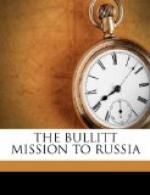Mr. BULLITT. The first night after I got in Col. House went to the telephone and called up the President right away and told him that I was in, and that he thought this was a matter of the utmost importance, and that it would seem to be an opportunity to make peace in a section of the world where there was no peace; in fact, where there were 23 wars. The President said he would see me the next evening down at Col. House’s office, as I remember it. The next evening, however, the President had a headache and he did not come. The following afternoon Col. House said to me that he had seen the President and the President had said he had a one-track mind and was occupied with Germany at present, and he could not think about Russia, and that he had left the Russian matter all to him, Col. House. Therefore I continued to deal with Col. House directly on it inasmuch as he was the delegate of the President, and Lloyd George, in the matter. I used to see Col. House every day, indeed two or three times a day, on the subject, urging him to obtain action before April 10, which, as you will recall, was the date when this proposal was to expire.
NANSEN PLAN TO FEED RUSSIA
Meanwhile Mr. Hoover and Mr. Auchincloss had the idea of approaching peace with Russia by a feeding proposition, and they had approached Mr. Fridjof Nansen, the Arctic explorer, and got him to write and send the following letter to the President. You doubtless have seen his letter to the President.
PARIS, April 3, 1919.
MY DEAR MR. PRESIDENT: The present food situation in Russia, where hundreds of thousands of people are dying monthly from sheer starvation and disease, is one of the problems now uppermost in all men’s minds. As it appears that no solution of this food and disease question has so far been reached in any direction, I would like to make a suggestion from a neutral point of view for the alleviation of this gigantic misery on purely humanitarian grounds.
It would appear to me possible to organize a purely humanitarian commission for the provisioning of Russia, the foodstuffs and medical supplies to be paid for, perhaps, to some considerable extent by Russia itself, the justice of distribution to be guaranteed by such a commission, the membership of the commission to be comprised of Norwegian, Swedish, and possibly Dutch, Danish, and Swiss nationalities. It does not appear that the existing authorities in Russia would refuse the intervention of such a commission of wholly nonpolitical order, devoted solely to the humanitarian purpose of saving life. If thus organized upon the lines of the Belgian Relief Commission, it would raise no question of political recognition or negotiations between the Allies with the existing authorities in Russia.
I recognize keenly the large political issues involved, and I would be glad to know




